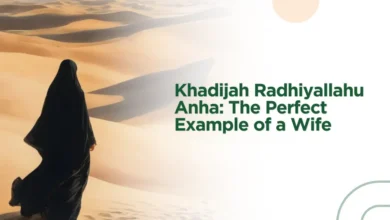Practical Guide to Zakat Fitrah
Zakat fitrah is one of the obligations for Muslims that must be carried out before the Eid al-Fitr holiday. Zakat-ul-Fitr plays an important role in cleansing the wealth and soul as well as helping those in need of food on Eid. In this guide, we will discuss the details of Zakat Fitrah, including the evidence from the Quran and Hadith as well as practical steps for its implementation.
Definition of Zakat Fitrah:
Zakat Fitrah is the Zakat that is obligatory with the last meal (Fitrah here means to break the fast) in the month of Ramadan. It is called Zakat Fitrah because Fitrah, which means breaking the fast, is the reason why it is obligatory.
The dalil for the obligation of Zakat Fitrah:
Zakat Fitrah is obligatory based on the following hadith of Ibn Abbas Radhiyallahu anhuma:
فَرَضَ رَسُولُ اللَّهِ -صلى الله عليه وسلم- زَكَاةَ الْفِطْرِ طُهْرَةً لِلصَّائِمِ مِنَ اللَّغْوِ وَالرَّفَثِ وَطُعْمَةً لِلْمَسَاكِينِ مَنْ أَدَّاهِا قَبْلَ الصَّلاَةِ فَهِىَ زَكَاةٌ مَقْبُولَةٌ وَمَنْ أَدَّاهَا بَعْدَ الصَّلاَةِ فَهِىَ صَدَقَةٌ مِنَ الصَّدَقَاتِ.
“The Messenger of Allah (blessings and peace of Allah be upon him) enjoined zakah fithri to purify the fasting person from joking and abusive words, and also to feed the poor. Whoever gives it before the prayer will have his zakah accepted, and whoever gives it after the prayer will have it regarded as a charity among charities.” (Abu Daud)
The wisdom of making Zakat al-Fitr obligatory:
In the hadeeth of Ibn Abbas Radhiyallahu anhuma above, it is also mentioned the wisdom of making Zakat Fitrah obligatory, namely as a cleanser from vain and abominable words and providing food for the poor so that they do not meet the day of Eid al-Fitr hungry.
Time of Zakat Fitrah obligation:
Zakat Fitrah is obligatory with the last fasting day of Ramadan, so babies born after the last fasting day of Ramadan are not obliged to pay Zakat Fitrah, while babies born before the last fasting day of Ramadan, their parents are obliged to pay Zakat Fitrah. If a person dies after the last fast of Ramadan, his heirs are obliged to pay Zakat al-Fitr from his estate, while if a person dies before the last fast of Ramadan, he is not obliged to pay Zakat al-Fitr, so his heirs are not obliged to pay Zakat al-Fitr from his estate.
Who is obliged to pay Zakat Fitrah?
Zakat Fitrah must be paid by all Muslims who have enough food on the day of Eid al-Fitr, whether they are slaves or free, men or women, adults or children. This is mentioned in the following hadith:
فَرَضَ رَسُولُ اللَّهِ ﷺ زَكَاةَ الْفِطْرِ صَاعًا مِنْ تَمْرٍ أَوْ صَاعًا مِنْ شَعِيرٍ عَلَى الْعَبْدِ وَالْحُرِّ وَالذَّكَرِ وَالأنْثَى وَالصَّغِيرِ وَالْكَبِيرِ مِنْ المُسْلِمِينَ.
The Messenger of Allah (peace and blessings of Allah be upon him) enjoined Zakat al-Fitr (in the amount of) one sha’ of dates or one sha’ of barley on slaves and free men and women and children and adults from among the Muslims.
Therefore, the head of the household is obliged to pay zakah on his family and those whom he is obliged to take care of according to shariah, such as his sisters and parents.
The amount to be paid for Zakat Fitrah:
Zakat-ul-Fitr is paid in the amount of 1 sha’ (about 2-3 kilograms depending on the type) of the staple food of the Muslims in the country where zakat is paid. This was mentioned by Abu Said Al-Khudri Radhiyallahu anhu:
كُنَّا نُخْرِجُ فِي عَهْدِ رَسُولِ اللَّهِ صَلَّى اللَّهُ عَلَيْهِ وَسَلَّمَ يَوْمَ الْفِطْرِ صَاعًا مِنْ طَعَامٍ وَقَالَ أَبُو سَعِيدٍ وَكَانَ طَعَامَنَا الشَّعِيرُ وَالزَّبِيبُ وَالأَقِطُ وَالتَّمْرُ
In the days of the Messenger of Allah (peace and blessings of Allah be upon him) we used to give on the day of Eid al-Fitr one sa’ of food, and Abu Said said: “And our food used to be barley, raisins, chickpeas, and dates.” (HR Al-Bukhari).
So in Indonesia it is better to give Zakat Fitrah with rice, sago, sweet potatoes, cassava, or other foodstuffs that are the staple food of local customs.
As for issuing Zakat Fitrah with money, the majority of scholars other than the Hanafi madhhab and Imam Ibn Taymiyyah prohibit issuing Zakat Fitrah with money, so we should issue Zakat Fitrah with what is clearly required in sharia, namely staple foods. However, it is permissible to issue Zakat Fitrah by entrusting some money to the Zakat Fitrah committee to buy rice and distribute it to the rightful ones.
When is Zakat Fitrah paid?
The recommended time to give Zakat Fitrah is on the morning of Eid al-Fitr before the Eid prayer. This is mentioned in the hadith:
أن النبي ﷺ ” أَمَرَ بِهَا أَنْ تُؤَدَّى قَبْلَ خُرُوجِ النَّاسِ إِلَى الصَّلاةِ.
The Prophet (peace and blessings of Allaah be upon him) ordered it to be paid before the people come out to pray (Eid).
However, it is permissible to give it 2-3 days before the day of Eid, based on the following atsar of Ibn Umar (may Allah be pleased with him):
أَنَّ عَبْدَ اللَّهِ بْنَ عُمَرَ كَانَ يَبْعَثُ بِزَكَاةِ الْفِطْرِ إِلَى الَّذِي تُجْمَعُ عِنْدَهُ قَبْلَ الْفِطْرِ بَِيوْمَيْنِ أَوَْلَثَةٍ
“‘Abdullah ibn ‘Umar gave Zakat al-Fitr on his dependents two or three days before Eid al-Fitr.” (HR Malik in Muwatho’)
It is only permissible to give Zakat al-Fitr before its due date if there is difficulty in giving it on time, and it is not permissible to give Zakat al-Fitr after the Eid prayer.
Who is entitled to receive Zakat Fitrah?
The people who are entitled to receive Zakat Fitrah are those who are not obliged to pay it, namely the poor who do not have basic food for Eid al-Fitr.
Where is Zakat Fitrah issued?
Zakat Fitrah is paid in the place where the muzakki broke his fast on the last day of Ramadan, so a person who went on an Umrah trip until Iedul Fitri should pay Zakat Fitrah in Makkah or Madinah, and a person who traveled should pay Zakat Fitrah in his hometown.
This is a brief guide to Zakat Fitrah, from who is obliged to pay it to where it is paid. May Allah, the Almighty, make it easy for us to give Zakat al-Fitr and make it a means of cleansing our souls before Eid al-Fitr.
Referensi:
- أحكام مختصرة في زكاة الفطر – الإسلام سؤال وجواب. (n.d.). Islamqa.info. Retrieved March 15, 2024, from https://islamqa.info/ar/articles/69/%D8%A7%D8%AD%D9%83%D8%A7%D9%85-%D9%85%D8%AE%D8%AA%D8%B5%D8%B1%D8%A9-%D9%81%D9%8A-%D8%B2%D9%83%D8%A7%D8%A9-%D8%A7%D9%84%D9%81%D8%B7%D8%B1
- إسلام ويب. (2023). Islamweb.net. https://islamweb.net/ar/fatwa/71201/%D8%AD%D9%83%D9%85-%D8%A5%D8%AE%D8%B1%D8%A7%D8%AC-%D8%B2%D9%83%D8%A7%D8%A9-%D8%A7%D9%84%D9%81%D8%B7%D8%B1-%D9%86%D9%82%D8%AF%D8%A7
- MSc, M. A. T. (2010, August 24). Panduan Zakat Fithri. Rumaysho.com. https://rumaysho.com/1219-panduan-zakat-fithri.html#_ftn5







